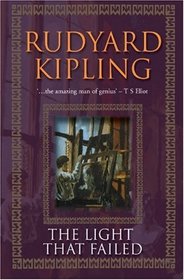After viewing the teleplay My Boy Jack which tells the story of Rudyard Kipling's son's short career in the British Army in World War I, I realized I had never read a book by Kipling, who is held in high regard in English literature. Not wanting to read one of his Jungle Book series, I thought this would be a good choice.
I sort of knew the story from having seen the film many years ago, but didn't remember a lot of details. The book was an okay reading experience but I was not blown away. This was Kipling's first novel, and critics note that its structure isn't perfect. The author has a way with describing things that makes them come alive. But the narrative was a bit clunky. It starts with the hero's childhood experience in a foster home (reminiscent of David Copperfield), then picks up with him as an adult in the Sudan during the conflicts there, then follows him to London and has long meandering chapters about his yearning for his childhood sweetheart -- who was sort of a twit in my opinion. Then it lurches into his blindness and its ramifications to an artist, and closes with a quick wrap up.
So, while Kipling's later books may be masterpieces of narration, this is perhaps not a shining example of what he became as a writer when he matured.
I sort of knew the story from having seen the film many years ago, but didn't remember a lot of details. The book was an okay reading experience but I was not blown away. This was Kipling's first novel, and critics note that its structure isn't perfect. The author has a way with describing things that makes them come alive. But the narrative was a bit clunky. It starts with the hero's childhood experience in a foster home (reminiscent of David Copperfield), then picks up with him as an adult in the Sudan during the conflicts there, then follows him to London and has long meandering chapters about his yearning for his childhood sweetheart -- who was sort of a twit in my opinion. Then it lurches into his blindness and its ramifications to an artist, and closes with a quick wrap up.
So, while Kipling's later books may be masterpieces of narration, this is perhaps not a shining example of what he became as a writer when he matured.




